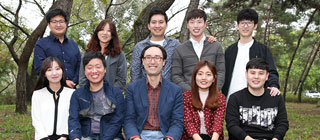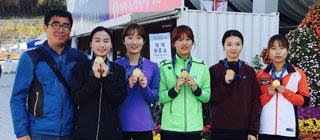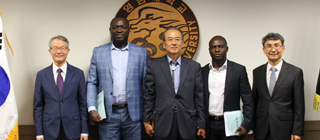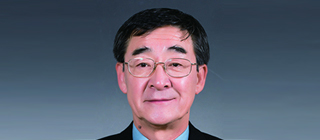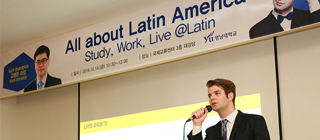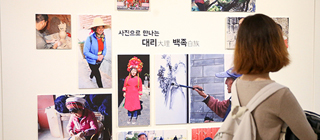-
20 high ranking public officials including the governor and vice-governor of Bolikhamxay Received 5 days of Saemaul Undong education and field studies at the YU Institute for International Development Unprecedented case for persons from emerging countries to receive training at own expense... Recognition of 'high quality of Saemaul education' [Nov 11, 2016] <High ranking public officials such as the governor of Bolikhamxay, Laos spent their own money at YU to receive 'Saemaul' training.> Global requests and interests on learning about the Saemaul Undong is rising. Recently, senior public officials of Laos spent their own money to come to YU and receive training Saemaul Undong. This shows that YU's Saemaul Undong training program is receiving attention as premium global education. From the 7th to 11th, the YU Institute for International Development Cooperation (Director Han Dong-geun) conducted Saemaul Undong training programs at the request of Bolikhamxay Province of Laos. This Saemaul Undong program held for four nights and five days was joined by 20 high ranking public officials of Bolikhamxay including Governor Kongkeo Xaysongkham) and Vice-governor Bounseng Pathammavong. This training session was organized through the direct request of Bolikhamxay Province, Laos to learn about the economic development experience and policy knowhow of Korea through the Saemaul Undong at YU, which is an educational institute specializing in Saemaul Undong. This was even more meaningful as all costs for the program was paid for by Bolikhamxay Province. Most of the Saemaul Undong training in Korea for personnel from emerging countries were of invitations by the central and local governments, public institutes and companies. However, the Saemaul Undong training at YU by public officials from Bolikhamxay, Laos was a very rare case where they paid for all expenses. It is judged that this is another case in which the meaning and value of the Saemaul Undong was recognized by the international community. The participants received education on 'Saemaul Undong and Korea's economic development' and 'Application plan of the Saemaul Undong and Korea's regional development policies for Bolikhamxay, Loas', while also joining various field trips to experience the development history of Korea at Ulsan Hyundai Motors and Pohang POSCO. Governor Kongkeo Xaysongkham of Bolikhamxay Province who came to YU leading a group of 20 said, "I was able to see and learn a lot about Korea's compressed growth and the role of the Saemaul Undong," and added, "Based on the Saemaul spirit that I gained through this program, I will try to integrate the Saemaul Undong and Korea's development experience in the local development of Bolikhamxay Province." Bolikhamxay Province, which is located in the central region of Laos, has an area of 15,977㎢ and a population of approximately 250,000 making it the 10th largest province of Laos. It possesses rich natural resources and various cultures, but it has a weak labor force due to its small population and the majority are in absolute poverty. However, due to the unique sentiments of Laos, it is having trouble overcoming poverty. It is expected that with the senior public officials from Bolikhamxay, Laos receiving Saemaul Undong training, it will be possible to help develop the local economy by utilizing Saemaul Undong. Institute for International Development and Cooperation Director Han Dong-geun, who oversaw this training program, said, "The success of the Saemaul Undong depends heavily on the understanding of the Saemaul spirit and the changed attitude of residents and the firm philosophy and will to continue the policies by leaders." He added, "I hope that the experiences in this program will be a good opportunity to apply the Saemaul Undong to fit the circumstances of Laos."
-
'First YU Exchange Student Expo' held on 9th and 10th Current exchange students abroad and foreign exchange students at YU joined to offer vivid accounts and information Participated by 14 sister universities from 12 countries, provide exchange student information and local living tips [Nov 10, 2016] <First YU Exchange Student Expo> YU held its first Exchange Student Expo. This expo was held at the square in front of the clock tower at the main gate of YU for two days on the 9th and 10th. This event was organized with the goal of improving the global capacities of students by providing overseas exchange student program information and to encourage participation. This expo, which was held under the supervision of the YU International Exchange Team, was joined by 14 sister universities from 12 countries including Germany, France, Sweden, England and China. At the booths for each university, YU's international PR ambassador students, foreign students studying at YU as exchange students, and students who studied abroad as exchange students participated in the event. Leonie Mahacke (22) from the Philipp University of Marburg in Germany said, "Through the exchange student program, I was able to learn a lot especially in the cultural sector," and added, "Through this expo, I would like to give detailed information such as studying majors in foreign universities, local cultures and environment, and cost of living to my friends who are interested in exchange student programs." At the expo, domestic and foreign students who participated in actual exchange student programs offered vivid and realist information based on their experiences such as housing, life, culture and education in a foreign country, and received great reviews from students. Yang Min-seok (22, YU School of Mechanical Engineering, sophomore) who visited several booths including Germany and Vietnam, said, "I wanted to study abroad as an exchange student when I am a junior. I came here to receive information." He added, "By studying as an exchange student, I will noy only be able to improve my foreign language skills, but also gain global capacities that will help me to find the job I want and can also help me at work as well. I hope to gain information on many universities through this opportunity and choose the country and university I want to go as an exchange student to." Sung Gyung-mo (25, YU School of Mechanical Engineering, senior), who returned after studying at Skovde University in Sweden for one year from August 2015 said, "While experiencing the culture and classes different than that of Korea, I was able to learn a lot despite the short time. The exchange student program is a program to kill four birds with one stone to improve global capacities, earn credits, and to save time and expenses compared to other study-abroad programs." He added, "I wanted to recommend by friends and juniors to this and that is why I participated in this expo." In addition to the exchange student program, YU also used the expo to provide information on various overseas programs such as the concentrated domestic and foreign outbound pilot program (OPP), themed backpacking program (Window to the World), language and cultural exchange program between foreign exchange students and domestic students (LPP, buddy program), and mid- to long-term language programs with overseas sister universities. 15th YU International PR Ambassador Chairperson Jung In-joon (25, School of Economics and Finance, junior) who prepared for this expo said, "In addition to exchange student programs, YU operates various overseas dispatch programs and global capacity improvement programs. I hope that students come not only to events such as this expo, but also regularly visit the school's international exchange team or homepage to obtain information and participate in actual programs in order to take another step out to internationalization." Meanwhile, YU signed sisterhood relations with 358 universities in 50 countries as of November 2016 and is currently operating various international exchange programs. Every semester, over 200 YU students are sent overseas as exchange students, while over 200 foreign students from overseas sister schools are studying at YU. YU is planning to expand upon the exchange student expo held for the first time this year to improve the international capacities of students next year.
-
YU Park Chung Hee Saemaul Institute holds 2016 international conference Joined by over 600 scholars, experts, etc. from 42 countries at Gumi Hotel Geumosan on 20th 'Implications of Korean model for sustainable development [October 20, 2016] <The 2016 Park Chung Hee Saemaul Institute International Conference was held in its biggest scale with over 600 participants from 42 countries> With the international community adopting and pursuing the '2016-2030 sustainable development goals (SDGs)', an international conference was held on the 20th at the Hotel Geumosan at Gumi, Gyeongbuk to share the compressed growth experience achieved by Korea with the international community. The '2016 Park Chung Hee Saemaul Institute International Conference' was co-hosted by the City of Gumi and YU, supervised by the Park Chung Hee Saemaul Institute (Director Choi Wae-chul), and sponsored by the Global Saemaul Forum, Global Development Foundation, and Yeungnam University College. This academic held under the theme 'Why is the World Paying Attention to the Republic of Korea - The Implications of Korean Model for Sustainable Development -' was made up with presentations and discussions from scholars and experts from Tanzania, Uganda, Vietnam, Bulgaria, and the US, and was the largest ever with over 600 participants from 42 countries including international students enrolled at the YU Park Chung Hee School of Policy and Saemaul, Saemaul leaders and scholars. This conference was organized to share Korea's compressed growth experience, which has become a model case for official development aide (ODA) recipients as it transformed from a 'nation that received aide to a nation that gives aide'. In particular, cases and evaluation of the Saemaul Undong as a practice model of the '2016-2030 Sustainable Development Goals (SDGs)' for making improvements on global poverty by international organizations such as the UN was given special attention. At the opening ceremony of the conference held at 1:30 p.m., Tanzanian Speaker of the National Assembly Job Yustino Ndugai, Tanzian Parliament Member Mussa Azzan Zungu, and Former Speaker of the Korean National Assembly Kang Chang-hee gave keynote speeches. Tanzanian Speaker of the National Assembly Job Yustino Ndugai said in his keynote address, "The power of politics and leadership had a huge impact in Korea becoming a third world country into an advanced country in such a short period of time." He added, "The various success cases achieved through the economic development of Korea are essential for researching national development that is both swift and possible." The international conference is comprised of sessions 1, 2 and 3, and general discussions. <Session 1> is based on the theme of 'Korean development seen from the perspective of leadership and policies', and presentations were given by △Sofia University Professor Todor Tanev of Bulgaria (Educational Advisor to the Prime Minister of Bulgaria, and former Minister of Education) △ George Mason University Professor Hilton Root of the USA, and △ Kyunghee University Professor Ahn Jae-wook (Economics). <Session 2> was on the theme of ‘Sharing and challenges of Saemaul development for joint development of the global community, and presentations were given by △ Kyungpook National University Professor Lim Jin-gyu (College of Agricultural and Life Sciences) △ Mokwon University Professor Lee Jung-ho (Finance, Insurance and Real Estate Department), and △ YU Professor Christopher Sparks (USA) (Liberal Arts). <Session 3> was on the theme of ‘Cases and evaluation of Korea's development experience and globalization of Saemaul’ and presentations were given on various cases of Saemaul Undong by △ Vietnam Good Neighbors local employee Nguyen Thi Yen, △ Mayuge Province public employee Nakayima Solome of Uganda, and △Tanzania Regional Development Ministry public employee Mpangala Salome Fabien. In particular, Sofia University Professor Todor Tanev of Bulgaria, who presented results of comparative studies on Former President Park Chung-hee and Kim Il-sung, said, "Despite sharing the same cultures, South Korea achieved a constructive and prosperous society through economic development, while North Korea experienced slow economies, thus resulting in a mechanical and fixed society filled with people living in fear." He added, "Though there are some views of Park Chung-hee's politics as 'development tyranny', Park Chung-hee's leadership has an indisputable impact on the achievements made in the Korean society, or in other words, to progress the economy and democracy." The following discussion was emceed by YU Park Chung Hee School of Policy and Saemaul Dean Park Seung-woo, and under theme of 'The Implications of Korean Model for Sustainable Development', △ Seoul National University Honorary Professor Song Byung-rak △ Daegu-Gyeongbuk Development Institute Director Lee Joo-seok △ Yonsei University Professor Ryu Seok-choon (Sociology) △ UN World Food Programme Regional Director of Korea Lim Hyung-joon △ Segye Times editorial writer Cho Jung-jin, and △ Korea Rural Economic Institute International Agricultural Cooperation Center Director Heo Jang spoke in the discussions. YU Park Chung Hee School of Policy and Saemaul Dean Choi Wae-chul, who organized this international conference, said, "This is the first year for the 2016-2030 SDGs agenda adopted by the international community last year to eradicate global poverty, and Korea's experience with compressed growth of overcoming the division of the nation and the Korean War from the poorest country into the world to an international contributor has given many inspirations for adopting the SGDs agenda." He added, "There has been a huge growth in demand for the sciencing and globalization of the Saemaul Undong, which is a UNESCO Memory of the World and the key driving force of Korea's development, in addition to Korea's development experience and leadership by the international community. Therefore, we hope that this international conference can meet some of such demands."
-
26th overall in the nation Result of college policies focusing on people such as professor research, internationalization, scholarships, etc. Professor research (23rd), scholarship rate (20th), foreign professors (8th), start-up activities (8th) [October 20, 2016] Overall Ranking Rank College Score 1 Seoul National University 240 2 Hanyang University (Seoul) 220 3 Sungkyunkwan University 218 4 Yonsei University (Seoul) 205 5 Korea University (Anam) 203 6 Ewha Womans University 188 7 Chung-Ang University 181 8 Kyunghee University 178 8 Hanyang University (ERICA) 178 10 Inha University 177 26 Yeungnam University 145 University Ranking Outside of Seoul Area Rank College 1 Yeungnam University 2 University of Ulsan 3 Korea University (Sejong) 4 Hallym University 5 Konyang University 6 Tongmyong University 6 Sunmoon University 6 Soonchunhyang University 9 Jeonju University 10 Dongguk University (Gyeongju) <2016 Jungang Ilbo College Rankings> YU was ranked first among private universities outside of the Seoul area in the 2016 Jungang Ilbo College Rankings. YU has kept first place for seven straight years since 2010. The rankings were held on 69 universities with at least four tracks among six tracks (humanities, sociology, natural science, engineering, medicine, arts/music/physical education). The overall index was comprised of professor research (10, 100 points), educational conditions (13, 100 points), student education and achievements (6, 70 points), reputation (4, 30 points) for a total of four sectors and 33 indices, and a total of 300 points. YU scored 145, ranking 26th nationwide, and first among general private universities outside of the Seoul area. In particular, YU received high rankings in the professor research sector, placing 23rd overall. This is the result of the positive efforts made by the university to improve research levels. YU is the only university in the nation to hold the 'research materials support project' that supports up to 4 billion won over four years by selecting 25 professors in the top 30% in terms of research capacities since 2013. Furthermore, in order to improve the quality of research, rather than using quantitative indices such as the number of papers or patents, qualitative indices such as the number of citations and technology fee income are used in the innovative research support programs that evaluate the achievements of professors. Such assertive support measures are shown in the college ranking results. In the evaluation, there were several areas related to research that placed in the top 20 sub-indices such as 15th in research fee per professor, 16th in number of citations for international papers, 13th in publication in international papers, and 15th in publishing in domestic papers for humanities and sociology. For education conditions, it received high marks for tuition-to-scholarship ratios (20th). YU recently raised the scholarship rate heavily over the past three years. The tuition-to-scholarship rate that was 14.7% (as announced in 2013) for 2012 continuously increased every year to 20.7% (as announced in 2016) last year. This is the result of expanding educational cost support for students even despite freezing and lowering tuition for the past several years. YU's international index was even higher. The rate of foreign professors and international student diversity was ranked at 8th. Of the 900 faculty members, 172 are foreign faculty, equating to about 20%, and there are over 1,100 international students from 74 countries studying at YU. Furthermore, YU's start-up support capacities were also ranked high with graduated student start-up activities at 8th and start-up education rate at 10th. The distinguished start-up education of YU is judged as a successful model for promoting student start-ups/ YU organized student start-up clubs as well as start-up education centers to provide guidance. It operates stage-by-stage start-up education programs by level focusing on users in order to strengthen the start-up capacities of students. It offers various practical start-up education procedures so that students can gain interest in start-ups and actually begin their own start-ups. Such support from the university resulted in an increase in the number of start-up clubs. The number of start-up clubs increased five-fold over the past four years. In 2014, there were only 14 of such clubs, but this year, there are 75, and over the four years, students founded 39 companies, showing the fruits of the university's positive support policies for start-ups.
-
Nine pass in national and provincial positions in 2016 Pioneering various fields utilizing the majors of graduates such as overseas forest development projects and forestry technicians Industry-government alumni construct 'employment cooperation network' to help students take their first step in society [October 20, 2016] <YU Department of Forest Resource and Landscape Architecture students, graduates and dean who passed the public employee exams for forestry technicians in 2016> (from top left clockwise: Cho Jin-hoon, Jeon Ji-hye, Sohn Young-joon, Lee Joon-hyeon, Park Soo-yeol, Oh Seung-min, Lee Ji-young, Dean Lee Joo-hyun, Lee Seung-joon, Park Hyun-jin) YU reported good news of students passing public employee exams for forestry technicians of 2016 en masse. A total of nine YU Department of Forest Resources and Landscaping Architecture (Dean Lee Joo-hyun) students and graduates passed national and provincial positions in the public employee examinations for forestry technicians of 2016, demonstrating that the department is a highly competent one. In particular, they swept the public employee examinations of various regions in Gyeongsangbuk-do such as Gyeongju, Mungyeong, Seongju, Uiseong, and Cheongdo. When considering that the number of forestry technician public employees is very low compared to other administrative positions, it is quite rare for a single department in a university to have so many students pass the exam. Among those who passed, a total of nine were from the YU Department of Forest Resource and Landscape Architecture. They are Lee Joon-hyeon (24, senior) in a national position (Korea Forest Service), and in provincial positions, they are Cho Jin-hoon (31), Park Soo-yeol (29), Sohn Young-joon (29) <three in Gyeongju>, Lee Seung-joon (26, senior), Lee Ji-young (22, junior) <two in Uiseong), Jeon Ji-hye (27, Mungyeong), Oh Seung-min (27, Cheongdo), and Park Hyun-jin (24, Seongju). Those who passed all said in agreement, "Most of the students in our department set their career goals early on and make the necessary preparations. In particular, the advice of our seniors who are currently public employees or employed at public corporations and private companies helped greatly." The YU Department of Forest Resource and Landscape Architecture organized an industry-academic cooperation committee and operates employment cooperation networks with alumni currently working in the industry or government. Alumni currently working in relevant fields are invited every year to give special lectures and brief meetings between alumni and current students. In addition, special programs were made for students preparing to become public employees to work with alumni to prepare for interviews and prepare for employment. This has become a tradition of this department. Park Hyun-jin, who passed the exam for Seongju-gun, said, "I regularly met with alumni who are public employees or working in companies and gained information, and naturally became interested in finding employment in this field." She added, "Once the career path is set, professors and the school provide full support. The department provided a lot of support so that I could gain various information by not only introducing alumni, but also with experts in various fields." Employment in regular companies also stand out. It operates a special student employment class where the dean is the advisor since 2014, and the results are beginning to stand out this year. In 2015, seven graduates found employment in the overseas forestry development project sectors, and there are also many graduates working in different fores resource areas such as forest technician offices, environmental research centers, and wood and paper companies. Lee Seung-joon, who passed the examination while still a student, said, "When my juniors begin to think about their occupation or career paths, I strongly urge that they seek assistance from professors and alumni. Instead of thinking on your own and searching for ways, seeking advice from those who have already experience the trials and errors and have more experience may be a short cut." He encouraged his juniors saying, "The alumni and professors are always ready to help. I received a lot of help as well, and I would like to give more back to my juniors than the help that I received."
-
Competed to represent the local region and helped Gyeongbuk take 4th overall Track and Field swept 7 medals including 4 gold Soccer takes first place in 4 tournaments including the National Athletic Competition, six medals in judo, ssireum and wrestling [October 18, 2016] <YU Track and Field coach and athletes who won a total of 7 medals including 4 gold at the 97th National Athletic Competition> YU earned five gold, four silvers and five bronze at the 97th National Athletic Competition that closed on the 13th, and contributed greatly in Gyeongbuk placing fourth overall. In particular, YU Track & Field (Coach Sohn Sang-young) swept seven medals including four gold, thus becoming the top college track & field team. Department of Special Physical Education senior Seo Ji-hyun (22) swept the women's 100m and 200m dash, as well as the 1,600m relay to take three gold, and also Department of Special Physical Education junior Shim Cha-soon (20) won the 400m hurdle and 1,600m relay for two gold. Seo Ji-hyun also won the bronze in the 400m relay and Shim Cha-soon took silver in the 400m, thus recording a total of four and three medals each. In addition, Department of Special Physical Education sophomore Kwon Jung-mi (20) won the gold in the 1,600m relay and bronze in the 400m relay, and Sports Science junior Lee Soo-hyun (21) won bronze in the 400m hurdle. <The YU soccer team won a total of four tournaments in 2016 with the victory at the National Athletic Competition> The YU soccer team (Coach Kim Byung-soo) that represented Gyeongbuk in the National Athletic Competition took the victory cup and the gold medal. The YU soccer team, which is the strongest team in collegiate soccer, won the '47th National Fall College Soccer Tournament' in July, the '13th Freshmen and Sophomore College Soccer Tournament' in August, and the '2016 U League' by winning all 12 matches, and thus became champions in four different tournaments. In addition, Choi Min-cheol (19, Sports Science freshman) won the silver medal in judo, Jeon Do-eon (19, Special Physical Education freshman) in ssireum, and Kim Jae-hoon (21, Sports Science freshman) in wrestling also won silver. Bronze medal winners included Jeon Dae-ho (22, Sports Science senior), Kim Yong-hak (19, Special Physical education freshman), and Kim Sung-soo (20, Special Physical Education sophomore) who competed in wrestling. The sports teams of YU participated to represent the region and performed with excellence in all fields.
-
Presidential envoy visits YU and requests personnel and fostering and council “The Saemaul Undong and Korea's development experience will be a great help in the development of our country" Cooperate in various ways such as policy advice and fostering personnel related to Saemaul [October 14, 2016] <The presidential envoy of the Central African Republic visited YU to request to learn Korea's Saeumaul Undong> The presidential envoy of the Central African Republic, which is located in the center of Africa, visited YU to learn about YU's Saemaul Undong. On the 13th, Mr. Aristide Briand Reboas (second from left on photo), who is the director of the Central Intelligence Agency of the Central African Republic and the legal advisor to President Faustin-Archange Touadera, visited YU as a presidential envoy and met with Park Chung Hee Saemaul Research Center Director Choi Wae-chul (former Vice President of YU, Director of the Global Global Saemaul Development Network) and conveyed President Touadera's strong will to learn about the Saemaul Undong. Mr. Reboas said, "For the economic development of the Central African Republic that is struggling with poverty despite its rich natural resources, Korea's experience and the experience with Saemaul Undong that achieved today's development is ever worse environments are valuable." He added, "We would like YU, which has taken the initiative to share and transmit the Saemaul Undong in the international community, to act as an advisor for fostering relevant personnel and to teach the Saemaul Undong in the Central African Republic." Director Choi Wae-chul responded by saying that the Saemaul Undong can contribute greatly in the development of emerging countries, and stated, "We can provide cooperation in various ways related to Saemaul such as policy advice, fostering of human resources, and providing information." He added, "We will invite public officials from the Central African Republic to come study at the Park Chung Hee School of Policy and Saemaul that operates a master's degree course in Saemaul development for about 240 promising individuals from over 40 emerging countries as of now." The two sides agreed to continuously discuss concrete cooperation plans between the Central African Republic and YU, and to sign an MOU in the near future. Global Saemaul Development Network (GSDN) Secretary-general Kim Gi-soo and YU International Development Cooperation Center Director Han Dong-geun were also present. The Central African Republic has a population of 5.39 million (as of 2015) and the national per capita income is 359 dollars (as of 2014), and it is located in the central continental region of Africa 1,000km away from the ocean. It gained independence from France in 1960 and began diplomatic relations with Korea in 1963.
-
Recognized for excellent research achievements, contributions to development of pharmacy sector Increased possibility for developing new drugs to treat metabolic and allergy-related diseases Research published in world's top SCI journal for 2 straight years [October 12, 2016] YU College of Pharmacy Professor Jang Hyun-wook (64) was selected as the winner for the 'Handok Academic Award'. The 'Handok Academic Award' was founded jointly by Handok (CEO and Chairman Kim Young-jin) and the Pharmaceutical Society of Korea (Chairman Sohn Ui-dong) to promote research in the pharmacology sector, and is presented annually to researchers who contributed greatly to the development of pharmacology through extraordinary research results. Professor Jang was selected as the winner for the 47th Handok Academic Award for not only his research on metabolic diseases, but also creatively presenting the possibility of developing new drugs that could treat both allergy and inflammatory diseases. Professor Jang became the first to discover that mast cells, which are the main cells involved in allergic reactions, can negative regulate AMPK (AMP-activated protein kinase), which is an energy detection protein for reactions activated by antigen-antibody stimulation. The research results were published in the most authoritative journal in the allergy field in 2013 Journal of Allergy and Clinical Immunology (JACI). Furthermore, it was recognized for discovering new allergy treatment targets and was selected as an 'excellent basic research case' in the 2014 National Research Foundation'. In his follow-up research, Professor Jang's research finding that AMPK and the signal regulation phospho-enzyme ERK1 and 2 (extracellular signal-regulated kinase 1/2) suppresses inter-activation were published in JACI for two consecutive years. His research was selected as a highlight paper of the journal and thus recognized for the excellence of the research. In addition, Professor Jang was also recognized for his contributions in not only research, but also education and was awarded the Ministry of Education Award on the 33rd Teacher's Day in 2014, as well as the Gyeongsangbuk-do Culture Award (Natural Science sector) in 2013. Meanwhile, the Handok Academic Award is scheduled to hold the presentation ceremony at the 'Pharmaceutical Society of Korea 70th Anniversary International Academic Conference (Oct 18 - 20)' that will be held at the Seoul The K Hotel on the 19th.
-
Students show huge interest in the first-ever 'Latin America Seminar' Joined by a current diplomat who is an alumnus in the Ministry of Foreign Affairs, and the Brazilian Embassy in Korea to give up-to-date information YU signs exchange agreements with prestigious universities in Central and South America from last year [October 14, 2016] <Latin America Seminar on the 14th (All about Latin America - Study, Work, Live @ Latin)> YU students are showing huge interest in Latin America. At 10:30 a.m. on the 14th, the Latin America seminar was held on the main auditorium on the third floor of the YU International Exchange Center. YU students filled up the seats to gain information about Latin America. This seminar raised interest of students on Latin America, which is receiving attention as a new land of opportunity. This event was held so that students could gain opportunities to study and work in Latin America. The seminar was joined by YU alumnus Kim Byung-joon, a current diplomat and manager under the Ministry of Foreign Affairs Central and South America Cooperation Department (YU, Business Administration, '88), and officer of education for the Brazilian Embassy in Korea, Carlos Augusto Cardoso Gorito, who is famous for appearing on the JTBC Show <Abnormal Summit> to represent Brazil. Mr. Carlos Gorito said, "Though Central and South America is geographically far away from Korea, the relationship is becoming closer. There are many Korean companies opening branches and trade is growing every year as well. But there is an absolute lack of local experts who understand the market." He added, "Central and South America has a huge market and the economy is growing, and it is also becoming more and more stable politically, so it is an opportunity with many opportunities. It also has interesting cultures and a lot of fun things to d so it will be a great place to live." He further stated, "Korea has many similar cultures with the rest of Asia, many people have traveled to the US and Europe, but by going to Central and South America, I am confident that you will be able to gain new experiences and views. I really want you to experience Central and South America while you are college students in your 20s." <Carlos Augusto Cardoso Gorito, Brazilian Embassy in Korea, education officer> Ministry of Foreign Affairs Central and South America Cooperation Department Manager Kim Byung-joon said, "Central and South America spent turbulent times in terms of its politics and economy including their period of Spanish colonization. But in the past ten years, it has been recording continuous economic growth at approximately 5% per year, and there are many countries that are rich natural resources such as Chile, Peru and Brazil. Furthermore, it is pursuing political and economic integration such as launching the Community of Latin American and Caribbean States (CELAC) and the Union of South American Nations (UNASUR), which are organizations the includes all of Central and South America." He added, "Our government is focusing on diplomatic relations with Central and South America, which has high possibility as a growth engine for the global economy, and there will be more opportunities for our companies and students to engage in Central and South America." <Business Administration Class of '88 Ministry of Foreign Affairs Central and South American Cooperation Department Manager Kim Byung-joon participated in the Latin America Seminar> In particular, Mr. Kim Byung-joon drew attention from students by providing a concrete economic index and explaining the diplomatic environment of Central and South America based on experience and information he possesses as a diplomat, such as the policy directions of our government for Central and South America, and the significance of President Park Geun-hye's visits to Central and South America that started from last year. YU Department of Business Administration Senior Park Chan-young (25), who attended the seminar said, "I have been interested in Central and South America so I took a Spanish language class at school and also took a two month trip to Central and South America." He added, "After listening to the seminar, I learned that the economy is much bigger than I thought, and also learned that it is actively trading with Korea. I think the information I gained at the seminar will be useful as I choose my career in the future." As the growth of the trading market with the US, Europe, China and Japan has met its ceiling, Latin America is rising as a new possibility. In particular, as the image of Korea in Latin America is good thanks to the Korean pop culture wave, accessibility is better than ever now. Starting from last year, YU has been signing MOUs with various prestigious universities in Latin America and has taken the initiative for internationalization so that students could more easily enter Latin America. YU has made global partnerships for human resource exchange such as for students and professors, as well as academic exchange with seven of the top 10 universities in Latin America such as Sao Paulo University in Brazil, the most prestigious university of Latin America, as well as UNICAP, University of Brasilia, Catholic University of Chile, Columbia National University, National Autonomous University of Mexico, and the Monterrey Institute of Technology and Higher Education. YU is operating student exchange programs with these universities. Four students were selected and they are scheduled to be sent to Latin America, and Duoc University of Chile and the University of Brasilia are also scheduled to send one student each to YU next year for studies. Jung Dong-won (23), a junior at the YU Department of Business Administration, who will go to Duoc University in Chile next year for one year as an exchange student, said, "After learning that our university signed exchange MOUs with universities in Central and South America last summer, I became interested in applying as an exchange student to these schools. Most students tend to go to English-speaking nations for exchange student or language courses, but I think that learning the Spanish culture and language is also competitive." He added, "I will work hard on learning Spanish before I leave and will do my best to learn as much as I can while I study overseas." In the future, YU is planning to increase the number of exchange students through study-abroad seminars for Latin America, and is also conducting reviews to offer regular language courses for Spanish and Portuguese, and continue to offer programs for students to learn more about Latin America.
-
Special Exhibit, 'Chaeunjinam, Dali Bai' opens until 30th of next month Joint research with Yunnan University, display over 150 pieces of everyday goods of the Dali Bai people Second following the special exhibit on 'Shilinyizu' in 2010 [October 11, 2016] <YU Museum Special Exhibit, 'Chaeunjinam, Dali Bai'> YU Museum (Curator Lee Su-hwan) is hosting the special exhibit 'Chaeunjinam, Dali Bai' that shows the life and culture of Chinese minority groups. This exhibit, which opened on the special exhibit room on the second floor of the YU museum at 4 p.m. on the 6th, was organized through the cooperation and joint research with the Yunnan University Anthropology Museum of China. YU worked with Yunnan University on two separate occasions in 2012 and 2015, and has worked on collecting everyday goods and data on the Bai people in China. This special exhibit displays the results of the research. In 2010, the 'Chaeunjinam, Shilinyizu' was held as a special exhibit in commemoration of exchange with Yunnan University, and this is the second special exhibit to examine the cultures of minority tribes in China. This special exhibit was organized in order to understand the daily life and culture of the 'Bai' people, which is the 15th largest minority of China. It has on display over 150 pieces from the daily life of the Bai people such as their traditional instruments, sculptures, dyeing cloth, wood blocks, clothing, etc. The pieces in this special exhibit are those found and researched by YU Museum in China. China's population is currently made up of 56 ethnic groups. Excluding the Han, who make up about 91.5% of the population, the remaining 55 are referred to as minority groups. The Bai people are concentrated in the Dail Bai Autonomous Prefecture in Yunnan Province, China, and as of 2010, the population is approximately 1.93 million. The name of the Bai people originates from the fact that they enjoyed wearing white clothes. As they are a group with rich history and culture, they have their own Bai language, and it is a group that has highly developed culture and arts from long ago. YU Museum Curator Lee Su-hwan (History Professor), who organized this special exhibit, said, "The Bai people continuously mixed with other cultures for over a thousand years and created their own unique and open culture. Their arts culture especially in architecture, natural dyeing, and sculpture are especially famous both in the East and West." He added, "I hope that more people will be able to understand the culture of the 'Bai' people, a minority group of China, through this exhibit." This special exhibit will be held until November 30 and admission is free for everyone. Hours of admission are from 10 a.m. to 5 p.m. on weekdays, and is closed on weekends and holidays. However, it will be opened on Saturdays for one month in October. For details, check the YU museum homepage (http://museum.yu.ac.kr/).
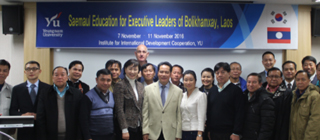
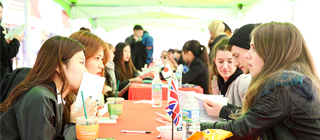
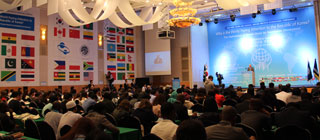
![[2016 College Rankings] '1st Place for 7th Consecutive Year' among Private Universities Outside of the Seoul Area](/app/board/attach/image/thumb_33211_1478053584000.do)
